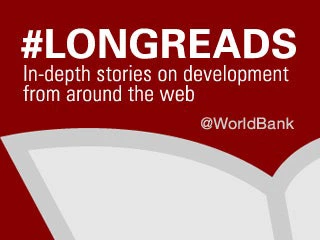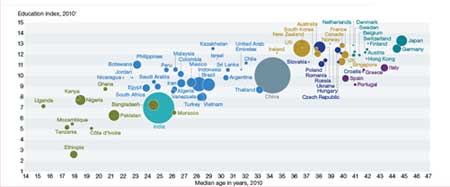Find a good longread on development? Tweet it to @worldbank with the hashtag #longreads.
“Why did 2,626 Mexicans move to Greenland?” tweeted open data guru Hans Rosling this week, highlighting a new visualization of human migration by Martin de Wulf, based on the Global Migrant Origin Database. Migrant workers are projected to send about $399 billion to their home countries in 2012. Their remittances are credited with buoying the economies of many developing nations in the aftermath of the financial crisis. The L.A. Times puts a human face on the migrant’s struggle to rise from poverty in “A Poor African Woman’s Journey to Home and Security.” Many Africans are migrants in their own countries, according to a new Gallup Survey funded by the Gates Foundation. Looking ahead at jobs skills and labor supply, McKinsey Global Institute’s World at Work study estimates employers will need millions more highly educated workers than will be available. For another take on the skills gap, check out Computer World’s “How to Prepare for the Coming IT Skills Revolution.”
L.A. Times: A Poor African Woman's Journey to Home and Security
(June 26)
Once a girl with no shoes, Samkeliso Moyo returns to her native Zimbabwe and with her savings and a dream.
Gallup World: Many Sub-Saharan Africans Receive Domestic Remittances
(June 18)
Thirty-two percent of adults in 11 sub-Saharan African countries -- or about 80 million people -- received money from family members or friends living in a different city of their country.
McKinsey & Co.: The world at work: Jobs, pay, and skills for 3.5 billion people (June 2012)
If current trends persist, there will be too few workers with advanced skills and too few job opportunities for low-skill workers in the future.
Computerworld: How to prepare for the coming IT skills revolution
(June 4)
The current tech talent gap is just the first sign of a coming revolution in the IT jobs market.
Longreads is a new, regular feature on the Voices blog highlighting development research and in-depth reporting.




Join the Conversation